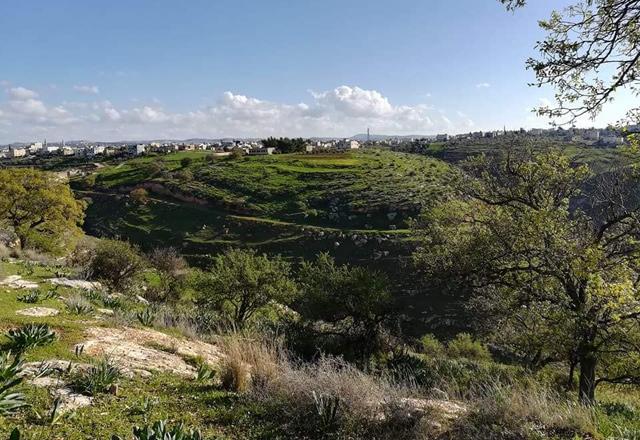You are here
Activists urge citizens to resist land sale for Israel gas pipeline
By Sawsan Tabazah - Jan 31,2018 - Last updated at Jan 31,2018
AMMAN — Jordan’s Boycott, Divestment, and Sanctions (BDS Jordan) movement urged Jordanians not to sell their lands to the government as part of a plan to build a pipeline to bring gas from Israel to Jordan under the gas deal signed in 2016.
Meanwhile, landowners gave mixed reactions to the issue after they learnt of the plan.
In September 2016, the National Electric Power Company (NEPCO) signed a 15-year agreement with Noble Energy, a Houston-based company that holds the largest share in the Israeli Leviathan Gas Field, with the aim of receiving $10 billion worth of natural gas supplies.
Last week, the Department of Lands and Survey (DLS) published an ad in Al Rai newspaper, announcing that the Ministry of Energy acquired some lands along Irbid, Ramtha and Mafraq where the pipeline is expected to be built. However, there was no mentioning in the ad that the lands would be used for this particular unpopular project.
In March 2016, it was reported that the Israel-Jordan joint pipeline was under construction near the Dead Sea, noting that it would transport natural gas from the Tamar field, 80km west of Israel's northern shores to the northern part of the Kingdom.
BDS Jordan urged citizens to refuse the decision through a message posted on Twitter. “The Zionist gas will slash your lands, farms and the heart of our dear Jordan by coercion. We call on you to reject the confiscation of the lands of your fathers for the future of our children as a refusal to the normalising agreement with the enemy,” the tweet read.
Jumana Ismail, a member of BDS Jordan, said that the movement's stance has been steady since it started in 2014. “The residents of the areas [Irbid, Ramtha and Mafraq] refuse the decision, as the Jordanian community does,” she alleged.
In previous remarks to The Jordan Times, MP Saleh Armouti said that the Energy Ministry promised to hand in a copy of the deal to the parliamentary energy committee after translating it into Arabic in May.
Jamal Qamweh, a member of the Lower House’s energy and mineral resources committee said that they did not receive the document yet.
Despite several attempts by The Jordan Times, the Ministry of Energy did not comment on the issue, with officials responding that only the minister can comment on this "sensitive issue" and he was not available.
Other senior official also did not return the contacts made by The Jordan Times.
The land owners themselves confirmed that they were contacted by authorities regarding the planned acquisition of private lands for the gas project.
Some expressed their "strong" disagreement with the decision, while others said they have "no problem" with selling the lands.
Sami Qaraan, who inherited a land in Irbid’s Taibeh area along with his eight brothers, said they all strongly refuse the offer. However, he believes that the pipeline will be built regardless.
Qaraan said that the DSL’s surveyors came to the area three months ago, informing them about the project. “We consulted a well-known lawyer, who said that, theoretically, we have the right to register an objection but that, ultimately, the state has the right to own the lands as long as they are providing financial compensation.”
Yasser Qaraan, another resident of Taibeh said that he does not accept a pipeline carrying gas from the Zionist entity, noting "the government did not consult us and is taking our lands by force.”
Meanwhile, Abu Emad said he supports the project and does not mind selling his land as long as it is benefiting Jordan.
Raed Hyasat, director of State Properties Department at DLS did not directly comment on the issue but noted that under the law, any lands needed for a governmental project that are in the interest of the community can be acquired by the state, which only accepts to consider objections by private owners within 15 days of publishing the ad.
Hyasat told The Jordan Times that the ownership in this case will be immediate and people will receive financial compensation.
Since 2016, many demonstrations and boycotting campaigns have been held to express Jordanians' refusal of the gas deal.
According to NEPCO, the agreement will help save Jordan around $600 million per year.
Related Articles
AMMAN — The Jordanian Construction Contractors Association (JCCA) will not compete for any tenders floated by the government to build a gas
AMMAN – "They do not want Israeli gas," the lawyer of a northern region residents whose lands have been acquired by the government to build
AMMAN — The government has officially acquired lands in the northern region for the purpose of building a pipeline to bring Israeli gas to J

















